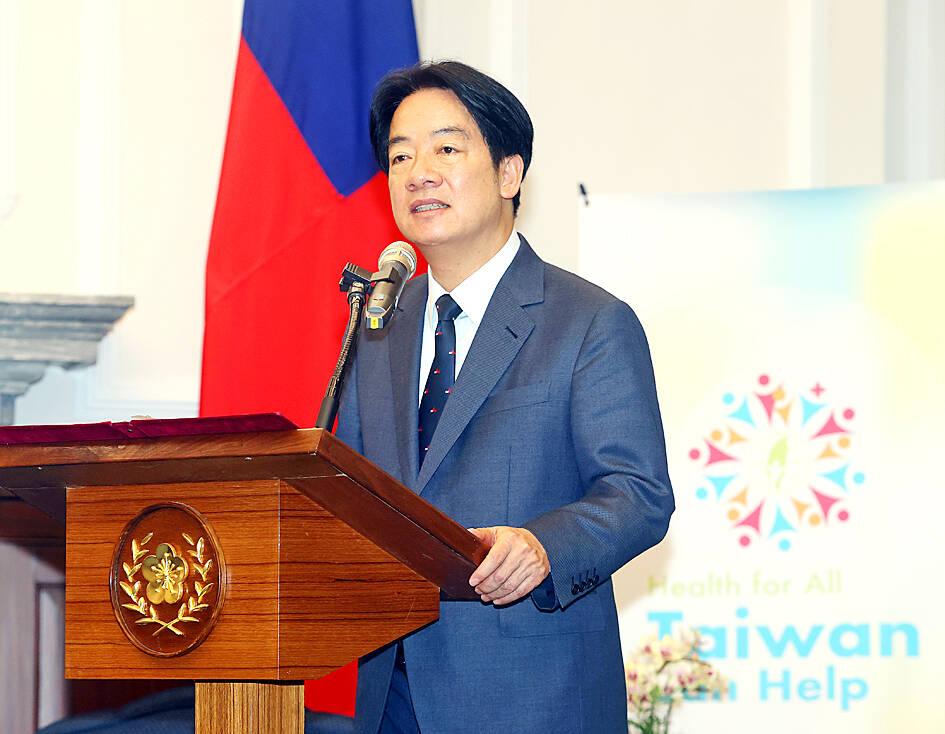President William Lai (賴清德) is to make a stopover in US territory during his trip to visit Taiwan’s South Pacific allies, sources from the Presidential Office said.
Lai is to make a stopover in Hawaii for two nights and Guam for one night, sources said, adding that Lai is to meet some old friends and attend banquets and closed-door forums organized by think tanks.
The stopover is based on the friendship between the US and Taiwan, they said, adding that the arrangement is routine practice based on principles of safety, dignity and convenience.

Photo: CNA
The officials thanked the US for offering assistance for the transit.
The government announced on Friday last week that Lai is to visit the nation's three diplomatic allies in the South Pacific — the Marshall Islands, Tuvalu and Palau — from Saturday to Friday next week.
It is to be Lai's first overseas trip since taking office on May 20.
During his trip, Lai is expected to meet Marshall Islands Nitijela (parliament) Speaker Brenson Wase, Marshallese President Hilda Heine, Tuvaluan Prime Minister Feleti Teo and Palauan President Surangel Whipps Jr.
Minister of Foreign Affairs Lin Chia-lung (林佳龍) today urged China not to "overreact" to Lai’s upcoming trip.
Lin said the National Security Council has prepared contingencies in the event of potential Chinese aggression and that the government is in close contact with allies and like-minded countries.
Lin said the government "did not rule out the possibility" that China would launch drills in response to Lai's overseas visit, given that Beijing had always responded "in some way" to overseas trips by previous Taiwanese presidents.
"We call on Beijing not to use the long-standing practice [of Taiwan's presidents traveling overseas] as a pretense to overreact, for example, by holding military exercises that risk destabilizing cross-strait relations," Lin told lawmakers.

INVESTIGATION: The case is the latest instance of a DPP figure being implicated in an espionage network accused of allegedly leaking information to Chinese intelligence Democratic Progressive Party (DPP) member Ho Jen-chieh (何仁傑) was detained and held incommunicado yesterday on suspicion of spying for China during his tenure as assistant to then-minister of foreign affairs Joseph Wu (吳釗燮). The Taipei District Prosecutors’ Office said Ho was implicated during its investigation into alleged spying activities by former Presidential Office consultant Wu Shang-yu (吳尚雨). Prosecutors said there is reason to believe Ho breached the National Security Act (國家安全法) by leaking classified Ministry of Foreign Affairs information to Chinese intelligence. Following interrogation, prosecutors petitioned the Taipei District Court to detain Ho, citing concerns over potential collusion or tampering of evidence. The

‘FORM OF PROTEST’: The German Institute Taipei said it was ‘shocked’ to see Nazi symbolism used in connection with political aims as it condemned the incident Sung Chien-liang (宋建樑), who led efforts to recall Democratic Progressive Party (DPP) Legislator Lee Kun-cheng (李坤城), was released on bail of NT$80,000 yesterday amid an outcry over a Nazi armband he wore to questioning the night before. Sung arrived at the New Taipei City District Prosecutors’ Office for questioning in a recall petition forgery case on Tuesday night wearing a red armband bearing a swastika, carrying a copy of Adolf Hitler’s Mein Kampf and giving a Nazi salute. Sung left the building at 1:15am without the armband and apparently covering the book with a coat. This is a serious international scandal and Chinese

Seventy percent of middle and elementary schools now conduct English classes entirely in English, the Ministry of Education said, as it encourages schools nationwide to adopt this practice Minister of Education (MOE) Cheng Ying-yao (鄭英耀) is scheduled to present a report on the government’s bilingual education policy to the Legislative Yuan’s Education and Culture Committee today. The report would outline strategies aimed at expanding access to education, reducing regional disparities and improving talent cultivation. Implementation of bilingual education policies has varied across local governments, occasionally drawing public criticism. For example, some schools have required teachers of non-English subjects to pass English proficiency

TRADE: The premier pledged safeguards on ‘Made in Taiwan’ labeling, anti-dumping measures and stricter export controls to strengthen its position in trade talks Products labeled “made in Taiwan” must be genuinely made in Taiwan, Premier Cho Jung-tai (卓榮泰) said yesterday, vowing to enforce strict safeguards against “origin laundering” and initiate anti-dumping investigations to prevent China dumping its products in Taiwan. Cho made the remarks in a discussion session with representatives from industries in Kaohsiung. In response to the US government’s recent announcement of “reciprocal” tariffs on its trading partners, President William Lai (賴清德) and Cho last week began a series of consultations with industry leaders nationwide to gather feedback and address concerns. Taiwanese and US officials held a videoconference on Friday evening to discuss the